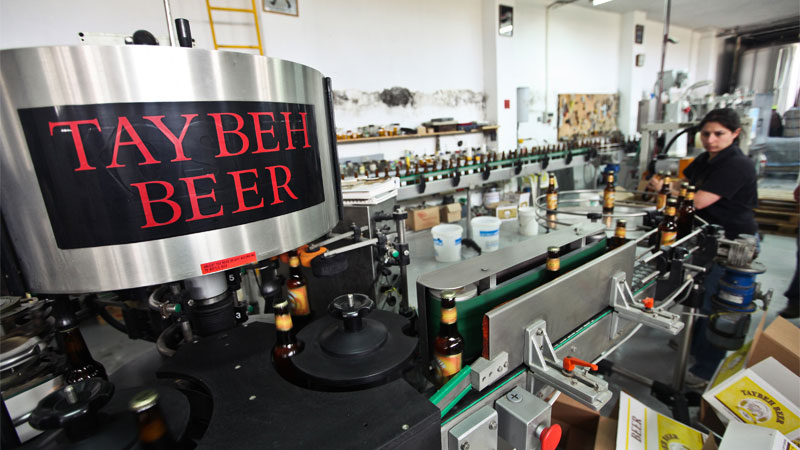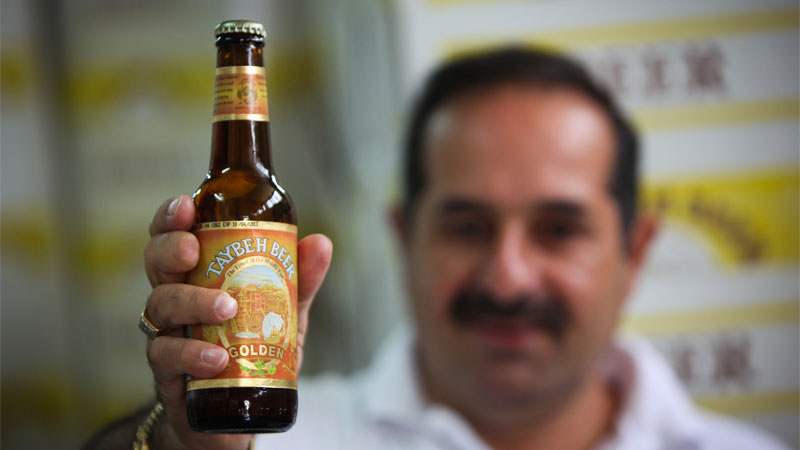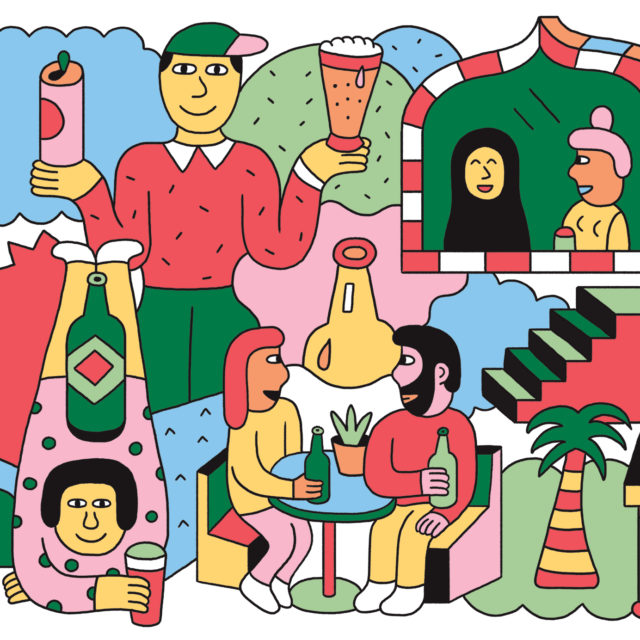The Khoury family is used to breaking barriers. They’re a Christian family in Palestine’s overwhelmingly Muslim West Bank, where alcohol is forbidden according to Islamic law. They’re Palestinian-American, citizens of both countries. And in 1994, husband and wife Nadim and Suheir Khoury moved back to their home village to help build the Palestinian economy by opening a brewery. Taybeh Brewery opened that same year. It was the first microbrewery in Palestine, and today remains one of a small handful in the Middle East.
While the family is breaking barriers, it’s also building bridges. The brewery is helmed by Nadim and Suheir’s daughter, Madees Khoury, who heads production of 1.8 million bottles of beer annually. And although Israeli-Palestinian talks have fizzled and an independent state does not seem likely, Taybeh sells about half its beer to local restaurants and shops in the West Bank, and another portion in Jerusalem — both Jewish West Jerusalem and predominantly Arab East Jerusalem. (The rest is exported abroad, mainly to Europe, and some to Japan.)
The brewery may be fulfilling the family dream to help the Palestinian economy, but it’s also helping connect Israeli and Palestinian beer drinkers.
On an afternoon last fall, Madees Khoury stood on a ladder next to a large stainless steel tank. “It’s a golden lager with 5 percent alcohol,” Madees said. “It’s not too malty, not too crispy. It’s a classic. Everyone enjoys a classic.”
That’s easy to say in most beer-producing regions, but in Taybeh’s case, “everyone” certainly isn’t going to come easy.

“They deserve a lot of credit for being the first to challenge Israel’s industrial beer duopoly and succeeding in carving a niche for themselves,” Doug Greener, writer and editor of Israel Brews and Views, a blog about Israeli craft beer, says. According to Greener, “Taybeh’s Golden, Amber, Dark, and White beers are brewed in the classical European tradition, reflecting the stipulations of the 500-year-old German Beer Purity Law (Reinheitsgebot). All four are good representatives of their style.”
Taybeh is the only all-Christian village in the West Bank, with about 1,500 full-time residents, although more typically visit in the summer. It’s not far from the Palestinian city of Ramallah, and there are several Jewish settlements nearby. Although alcohol is forbidden according to religious law, it is not under civil law — and many Muslims drink even though it is not allowed in Islam.
Nadim, his brother David, and their father started the family business in 1994, when Palestinian leader Yasser Arafat had returned to the West Bank from exile. It was the days of the Oslo Agreement between Israel and the Palestinians, which laid out a roadmap for an independent Palestinian state in the West Bank, Gaza Strip, and East Jerusalem.
Madees was 9 years old when her family decided to return from the U.S. to start a brewery in this quiet village in the West Bank. Now 34, Mahees is Taybeh’s brewmaster. She is believed to be the only female brewer in the Middle East.
“I basically grew up here in the brewery, and I really love making beer,” she said, sitting outside the brewery and sipping on the Winter Lager, which adds cinnamon and honey to the original golden lager recipe. The hills of the West Bank are green after a winter of heavy rain, and the almond trees are in blossom. The brewery also makes a dark beer, an amber, an IPA, and a non-alcoholic beer — a move to a market of religious Muslims and others abstaining from alcohol.

Madees went to high school in Ramallah, and then went back to the U.S. for college, where she earned a bachelor’s degree in business management from Hellenic College in 2007.
She returned to the West Bank in 2007, at 22, to rejoin her parents and uncle at the family brewery. After returning to the West Bank, she earned a masters in business administration from Bir Zeit University. While studying at Hellenic College she completed an internship at Harpoon Brewery in Boston, and later completed a brewing course in China, which included several (pre-pandemic) visits to Wuhan.
“My family believes that in order to build a state of Palestine and an economy, we have to invest our own money, our own knowledge, and our own experience into the country,” she said. “That’s more sustainable than foreign funds that can be cut off.”
It truly is a family mission: David, Madees’ uncle, served as the mayor of Taybeh from 2008 to 2013.
Also in 2013, the family opened the Taybeh Winery. Canaan Khoury, Nadim and Suehir’s son and Madees’ brother, runs the winery today. Canaan is also a master brewer and distiller, and is currently studying for an MBA at Stanford University. Taybeh Winery produces 35,000 bottles a year, and its bestseller is Beituni, made from a variety of ancient grapes.
Next, Nadim opened The Golden Hotel, an 80-room, LEED-certified hotel near the brewery, in 2016. It was in operation until early 2020, but the coronavirus pandemic caused many cancellations, and the hotel was forced to shut down. “This country does not have any oil or minerals like Saudi Arabia or Jordan,” Nadim said. “We count so much on the tourism sector.”
Sam Bahour, a Palestinian-American business consultant and the chair of the U.S. nonprofit Americans for a Vibrant Palestinian Economy (AVPE), which aims to build bridges between American and Palestinian enterprises, believes Taybeh beer, with Madees at its head, can change how many view Palestinians.
“[Taybeh Brewery] creates a product that breaks down many of the Western stereotypes about Palestine, like having women business leaders and dealing in alcoholic beverages, not to mention bringing a steady flow of tourists to a rural city,” Bahour says.
Bahour also sees Taybeh Brewery’s efforts as a form of peaceful protest: “Taybeh is an example of non-violent resistance to this military occupation that is imposed upon us by force, and shows how Israel refuses to even let an economic project thrive,” he says, adding, “Israel intentionally does not want to allow Palestinians to create a different reality on the ground.”
Nadim says the success of the beer makes all of the effort worth it. “It shows all the good things that we do, that people are very happy and therefore supportive,” he says. “It gives you good, positive feedback. This is how we can build the state of Palestine, by encouraging others to invest like we did.”
Amidst the pandemic, beer sales are in decline, and much of the staff of both the brewery and hotel are on paid leave. Yet the family is confident that the crisis will pass, and that demand for their beer will return. No matter what happens, the brewery holds a place in the family history, as well as the history of their homeland. Nadim says, “The brewery put Taybeh on the map of Palestine.”
